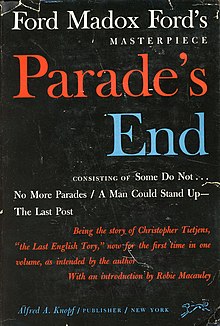 First complete edition cover (1950) | |
| Author | Ford Madox Ford |
|---|---|
| Language | English |
| Genre | Historical fiction, modernist novel |
Publication date | 1924–1928 |
| Publication place | United Kingdom |
Parade's End is a tetralogy of novels by the British novelist and poet Ford Madox Ford, first published from 1924 to 1928. The novels chronicle the life of a member of the English gentry before, during and after World War I. The setting is mainly England and the Western Front of the First World War, in which Ford had served as an officer in the Welch Regiment, a life he vividly depicts. The individual novels are Some Do Not ... (1924), No More Parades (1925), A Man Could Stand Up — (1926) and Last Post (1928).
The work is a complex tale written in a modernist style ("it is as modern and modernist as they come"), which does not concentrate on detailing the experience of war.[1] Robie Macauley, in his introduction to the Borzoi edition of 1950, described it as "by no means a simple warning as to what modern warfare is like... [but] something complex and baffling [to many contemporary readers]. There was a love story with no passionate scenes; there were trenches but no battles; there was a tragedy without a denouement."[2] The novel is about the psychological result of the war on the participants and on society. In his introduction to the third novel, A Man Could Stand Up--, Ford wrote, "This is what the late war was like: this is how modern fighting of the organized, scientific type affects the mind".[3] In December 2010, John N. Gray hailed the work as "possibly the greatest 20th-century novel in English", and Mary Gordon labelled it as "quite simply, the best fictional treatment of war in the history of the novel".[4][5]
- ^ Barnes, Julian (24 August 2012). "A tribute to Parade's End by Ford Madox Ford". The Guardian. England. Retrieved 29 June 2014.
- ^ Macauley, Robie (1950). "Introduction". Parade's End (Borzoi ed.). Alfred A. Knopf. p. vi.
- ^ Macauley, Robie (1950). "Introduction". Parade's End (Borzoi ed.). Alfred A. Knopf. p. vi. Robie Macauley includes Ford's quote to an earlier edition of A Man Could Stand Up-- in his introduction.
- ^ Gray, John. "John Gray's New Year's Resolution". New Statesman. Retrieved 18 September 2012.
- ^ Gordon, Mary (2012). "Book Reviews: Parade's End by Ford Madox Ford". Style. 46 (1): 112–115. Retrieved 26 February 2013.[permanent dead link]